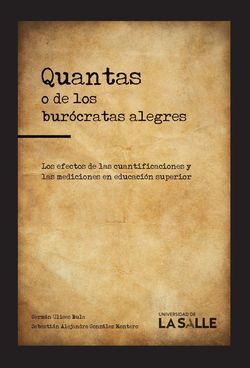Читать книгу Quantas o de los burócratas alegres - Germán Ulises Bula Caraballo - Страница 15
На сайте Литреса книга снята с продажи.
Notas
Оглавление1 Texto original:
the legislators who framed the ancient republics knew that their business was too arduous to be accomplished with no better apparatus than the metaphysics of an undergraduate, and the mathematics and arithmetic of an exciseman. They had to do with men, and they were obliged to study human nature. They had to do with citizens, and they were obliged to study the effects of those habits which are communicated by the circumstances of civil life. They were sensible that the operation of this second nature on the first produced a new combination; and thence arose many diversities amongst men, according to their birth, their education, their professions, the periods of their lives, their residence in towns or in the country, their several ways of acquiring and of fixing property, and according to the quality of the property itself— all which rendered them as it were so many different species of animals. From hence they thought themselves obliged to dispose their citizens into such classes, and to place them in such situations in the state, as their peculiar habits might qualify them to fill, and to allot to them such appropriated privileges as might secure to them what their specific occasions required, and which might furnish to each description such force as might protect it in the conflict caused by the diversity of interests that must exist and must contend in all complex society; for the legislator would have been ashamed that the coarse husbandman should well know how to assort and to use his sheep, horses, and oxen, and should have enough of common sense not to abstract and equalize them all into animals without providing for each kind an appropriate food, care, and employment, whilst he, the economist, disposer, and shepherd of his own kindred, subliming himself into an airy metaphysician, was resolved to know nothing of his flocks but as men in general. (pp. 185-186)
2 Esto se puede ilustrar contrastando el papel que juega el cero en el pléroma y la creatura. Para el primero, no tiene efecto alguno: si pateo una piedra con una fuerza de cero, se moverá cero; en cambio, en un contexto determinado —y, justamente, las creaturas funcionan en contextos—, la ausencia de mensaje, la llamada que no llegó, el saludo no regresado, etcétera, tienen efectos importantes (Bateson, 1993).
3 Esto se puede ilustrar contrastando el papel que juega el cero en el pléroma y la creatura. Para el primero, no tiene efecto alguno: si pateo una piedra con una fuerza de cero, se moverá cero; en cambio, en un contexto determinado —y, justamente, las creaturas funcionan en contextos—, la ausencia de mensaje, la llamada que no llegó, el saludo no regresado, etcétera, tienen efectos importantes (Bateson, 1993).
4 Esto se puede ilustrar contrastando el papel que juega el cero en el pléroma y la creatura. Para el primero, no tiene efecto alguno: si pateo una piedra con una fuerza de cero, se moverá cero; en cambio, en un contexto determinado —y, justamente, las creaturas funcionan en contextos—, la ausencia de mensaje, la llamada que no llegó, el saludo no regresado, etcétera, tienen efectos importantes (Bateson, 1993).
